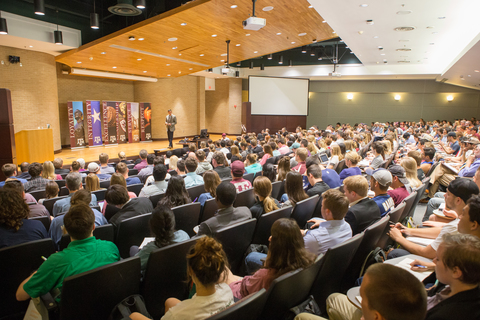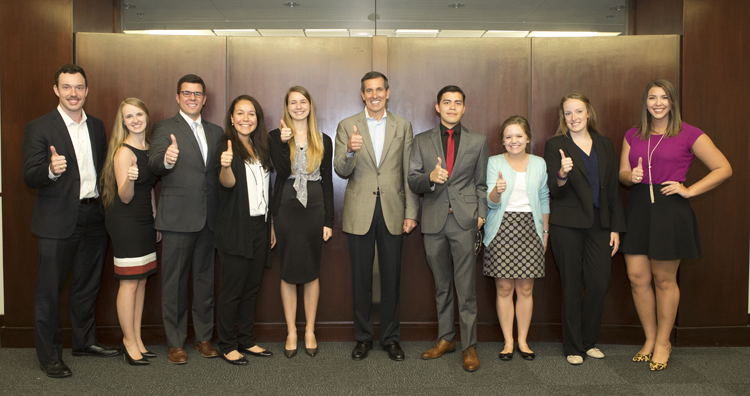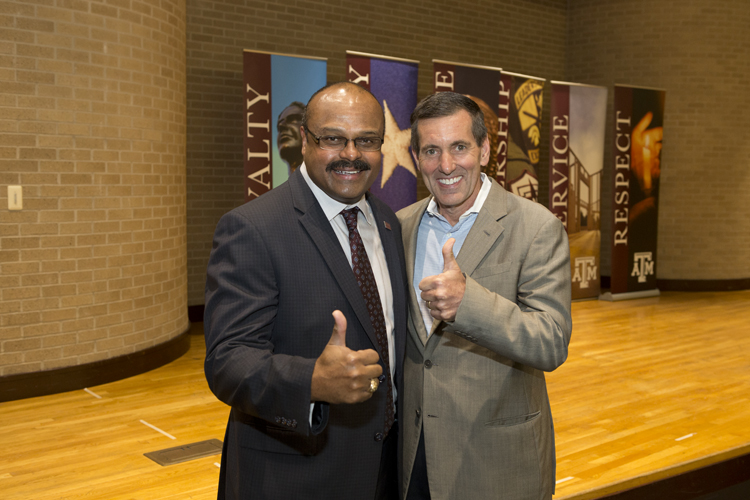Bruce Broussard ’84 advocates for personal touch in healthcare
October 10, 2016
|
Mays Business School
 Keeping the focus on the patients is the best strategy for succeeding in the healthcare industry, and person-to-person interaction is a powerful tool in any industry, Humana President and CEO Bruce Broussard ’84 said recently at Mays Business School. Broussard shared life stories and advice with more than 400 students and community members on Sept. 29. [Watch the full video of his presentation.]
Keeping the focus on the patients is the best strategy for succeeding in the healthcare industry, and person-to-person interaction is a powerful tool in any industry, Humana President and CEO Bruce Broussard ’84 said recently at Mays Business School. Broussard shared life stories and advice with more than 400 students and community members on Sept. 29. [Watch the full video of his presentation.]
“At the end of the day, people are motivated by people, not by technology,” he said. “Someone who has walked that path before is more influential than either or a nurse or a doctor.” Also, those working in health care are more motivated when they are working with patients than when they are removed from interacting with them, he said.
Broussard, a Texas A&M University graduate in finance and accounting, has a wide range of executive leadership experience in publicly traded and private organizations. He started his career as a consultant at Arthur Anderson, then was treasurer and CFO of various public companies and CEO of U.S. Oncology before joining Humana.
He is leading Humana to an integrated care delivery model that is expected to drive lower costs, enhanced quality, improved outcomes and a better member experience. With its holistic approach, Humana is dedicated to improving the health of the communities it serves by making it easy for people to achieve their best health.
Be nimble
While visiting Texas A&M, Broussard had meetings and meals with students, faculty members and administrators before delivering a presentation in the Ray Auditorium. He told the audience he considers adjusting to life’s unexpected turns a skill and a gift, and he urged the students to spend their time in college refining what they want out of life. “Take risks. Life is not certain, so you have to be open to what comes along,” he said. “And be flexible. I’ve learned more from the times when things didn’t go as I planned than when they did.”
Broussard was invited by Eli Jones, dean of Mays Business School, as this semester’s Dean’s Leadership Speaker. Last year, Mays hosted David Cordani ’88, president and CEO of Cigna Corporation and a counterpart of Broussard’s. They are also friends who found out as adults that they had attended the same high school.
Broussard and Cordani are in an elite group of Aggies – Texas A&M is third among universities with the most CEOs in the Fortune 500, as mentioned by Jones when he introduced Broussard. Jones pointed out that two of three top CEOs are graduates of the business school. Texas A&M President Michael K. Young also mentioned the ranking in his state-of-the-university address on the university’s Oct. 4 anniversary: “Making the joke ring true: What do you call an Aggie five years after graduation …. BOSS!”
Invest in others
Broussard said he gained much of his business knowledge by listening to books on tape, starting with motivational writer and speaker Zig Ziglar. “He said if you help enough others get what they want, you’ll get what you want,” he said. “I’ve tried to instill that in our people, as well as in our organizational structure. If you have happy employees, you’ll have happy customers because of those happy employees. That will make for a successful business, and happy shareholders.”
 To help keep the employees happy, Broussard said he invests time with them, either sitting with them during phone calls or going out in the field with nurses to assess members. He described a memorable visit with a member … “as we finished up the visit, I asked her what else we could do for her, and she responded, ‘I’m lonely. I haven’t seen my daughter or son in a week.’ That conversation gave me insight into the national epidemic of loneliness among patients, so we have made adjustments to address.”
To help keep the employees happy, Broussard said he invests time with them, either sitting with them during phone calls or going out in the field with nurses to assess members. He described a memorable visit with a member … “as we finished up the visit, I asked her what else we could do for her, and she responded, ‘I’m lonely. I haven’t seen my daughter or son in a week.’ That conversation gave me insight into the national epidemic of loneliness among patients, so we have made adjustments to address.”
Broussard said he invests time and effort in keeping his life balanced around his priorities of health, family, work, friends and spirituality. He is typically running or in the gym by 4:30 a.m., and if he travels, he tries to set aside time for family after he returns. “As your life becomes more and more complex, it becomes more difficult to carve out that time – but you have to,” he said. “These priorities have gotten me where I am and will get me to where I am going.”
Be consistent
Purpose and values are the most salient aspects of organizational culture, Broussard said. “The tone at the top – how I walk, talk and behave – sets the tone,” he said. “You see it even here at the university, everyone says ‘Howdy’ and is friendly. That is a culture.”
At Humana, the leaders express the tone of caring by listening and responding to both employees and customers. One Monday each month, Humana holds a “voice of the customer” workshop for three hours. The feedback comes in the form of phone calls, panel discussions or survey results.
Broussard said throughout his career he has seen leadership trends shift from “command and control” to collaborative and listening. “I have found diversity of thought of experience makes a better teacher. We call it a healthy tension. We try to have every voice represented at the table. We all come out of it richer, and the people are more thoughtful when making decisions.”
Currently, Broussard is gearing his company’s employees for an expected merger with Aetna. “Our executive team had a retreat and we committed that we will present to Aetna the best company possible, and look at those 50,000 associates as assets,” Broussard said.
One of the associates is Xingde Jiang, who is graduating in December with a doctorate in electrical engineering. He will be joining Humana in Dallas in big data consumer analytics. “The company has a lot of data to process, and I look forward to joining Humana and helping the executive team make actionable decisions,” he said.
Mays is a comprehensive business school that addresses the full range of topics and issues that exist across all functional areas of business. In pursuit of its vision to advance the world’s prosperity, the school recently identified three Mays Grand Challenges: Entrepreneurship, Energy and Healthcare.


